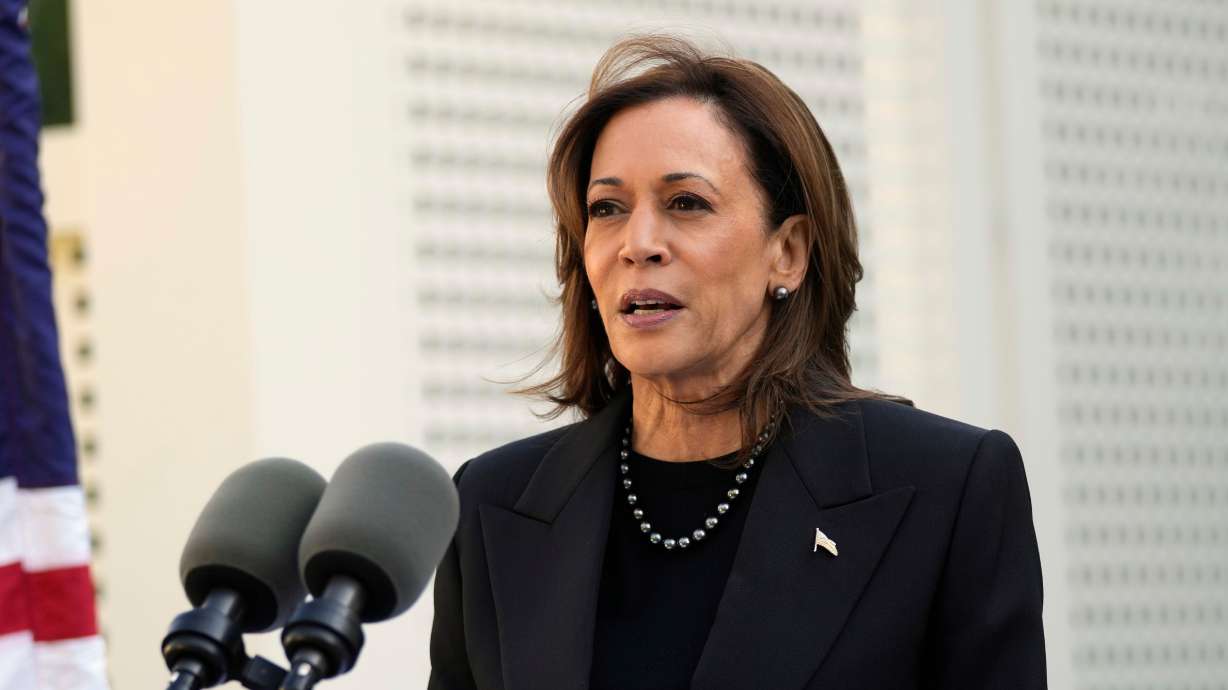Estimated read time: 4-5 minutes
This archived news story is available only for your personal, non-commercial use. Information in the story may be outdated or superseded by additional information. Reading or replaying the story in its archived form does not constitute a republication of the story.
- Vice President Kamala Harris has proposed expanding Medicare to cover home health care aides for seniors, aiming to support the "sandwich generation" balancing child care and elder care.
- The plan aims to help seniors stay at home, reducing reliance on more expensive nursing facilities.
- The proposal includes coverage for dental, vision and hearing services, with anticipated costs estimated at $40 billion annually.
SALT LAKE CITY — Vice President Kamala Harris wants to see Medicare expand to help with the cost of home health care aides for older adults, according to an interview this week on ABC's "The View."
"There are so many people in our country who are right in the middle. They're taking care of their kids, and they're taking care of their aging parents, and it's just almost impossible to do it all, especially if they work," the Democratic presidential nominee said, according to NPR.
In a fact sheet, the Harris campaign said nearly a quarter of Americans are "sandwiched" between caring for their own children and their parents or a loved one with a disability. NPR reported many of them are undecided in terms of who they'll vote for in the presidential race.
Harris said the additional cost to cover home health aides would be borne by expanding Medicare drug price negotiations. Right now, Medicare covers at-home skilled nursing care, home health aides and certain limited other services solely in specific circumstances. Families largely provide the care themselves or foot the bill.
The stated goal of Harris' "Medicare at Home" plan is to help older adults stay in their homes, which also costs less than in-facility care. The benefit would cover a number of in-home care services including health aides, Politico was told by a senior campaign official who was not named but reportedly had permission to discuss the proposal.
According to the New York Times, "Home health services that last more than a few months represent 'the biggest gap in Medicare,' said David Grabowski, a health policy professor at Harvard who studies long-term care. Medicaid, the federal-state program for the poor, covers home care for elderly and disabled Americans who need it, but people are forced to spend all their savings to qualify and often face long waiting periods."
Per the fact sheet, "These plans are common sense. They can help family caregivers work and save both families and the federal government money by allowing seniors to stay in their homes instead of being sent to nursing homes, which are often more expensive. Medicare at Home will also reduce hospitalizations. Vice President Harris will also call on Congress to stop a practice in which seniors' homes are seized following long-term Medicaid care."
More vision, dental
The plan also includes covering the cost of hearing aids and related exams for Medicare enrollees, per the campaign release. And it would provide coverage for eye exams, new glasses and lenses for the more than 90% of Medicare enrollees who need them. About half also have hearing loss.
"This will help more seniors live independently for longer and avoid falls, depression, and other harms. Over the long term, this can help lower costs to Medicare," the campaign said.
Overall, the cost of the proposed expansion is believed to be around $40 billion a year but would be offset in part by savings from keeping people in the community, rather than in facilities, per the Harris campaign.
"The large majority of this cost will be paid for by expanding Medicare drug negotiations, increasing the discounts drug manufacturers cover for certain brand-name drugs in Medicare, and cracking down on pharmaceutical benefit managers to increase transparency, disclose more information on costs, and regulate other practices that raise prices. Experts at Stanford University have found similar proposals would generate significant savings. The remainder of the costs of this proposal will be paid for by implementing international tax reform so that we stop encouraging companies to shift jobs and profits overseas," according to the fact sheet.
Open enrollment and what beneficiaries want
Meanwhile, Medicare's open enrollment period starts Oct. 15 and runs through Dec. 7. During that time, Medicare-eligible adults can change their picks in terms of options like whether they want traditional Medicare coverage or one of the many, many "advantage" plans.
And polling companies have been asking Medicare beneficiaries what pleases, vexes or worries them about the program.
This week, the private online health insurance marketplace eHealth released a survey of more than 1,200 Medicare enrollees who purchased Medicare Advantage, a supplement plan or Part D drug coverage through its marketplace. The survey found that three-fourths are worried about their out-of-pocket costs, half are worried about changes to their plan benefits and half are worried about prescription drug coverage.
Said eHealth CEO Fran Soistman in a written statement, "Beneficiaries are worried about the future, not just their ability to pay for the rising cost of their health care, but also the future of Medicare in general." Soistman added that most in the survey were very happy with Medicare coverage and hope there won't be "dramatic premium and out-of-pocket cost increases."
One change many would like to see is an annual enrollment period that is tied to their own birthdate, rather than the existing same-time-every-year enrollment period. At the least, a large majority would like to see the enrollment period this year lengthened because the election has been so distracting.










